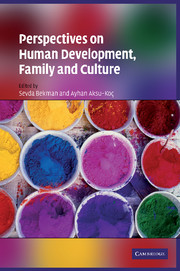Book contents
- Frontmatter
- Contents
- List of figures
- List of tables
- List of contributors
- Preface
- Foreword
- Selected international publications by Çiğdem Kağıtçıbaşı
- I Cultural and cross-cultural psychology: selected perspectives
- II Development in the family context
- III Culture and self
- IV Social change, family, and gender
- 13 One or two pathways to modernity? A systematic comparison of Kağıtçıbaşı's Model of Family Change and the Model of the Second Demographic Transition
- 14 Living together in culturally-plural societies: Understanding and managing acculturation and multiculturalism
- 15 Cultural continuity and discontinuity in Turkish migrant families: Extending the Model of Family Change
- 16 Values and attitudes of young people in urban Turkey: A further test of Schwartz's theory of values and Kağıtçıbaşı's Model of Family Change
- 17 Career development of professional women in Turkey
- V Induced change
- Epilogue
- Subject Index
- Author Index
- References
17 - Career development of professional women in Turkey
Published online by Cambridge University Press: 04 August 2010
- Frontmatter
- Contents
- List of figures
- List of tables
- List of contributors
- Preface
- Foreword
- Selected international publications by Çiğdem Kağıtçıbaşı
- I Cultural and cross-cultural psychology: selected perspectives
- II Development in the family context
- III Culture and self
- IV Social change, family, and gender
- 13 One or two pathways to modernity? A systematic comparison of Kağıtçıbaşı's Model of Family Change and the Model of the Second Demographic Transition
- 14 Living together in culturally-plural societies: Understanding and managing acculturation and multiculturalism
- 15 Cultural continuity and discontinuity in Turkish migrant families: Extending the Model of Family Change
- 16 Values and attitudes of young people in urban Turkey: A further test of Schwartz's theory of values and Kağıtçıbaşı's Model of Family Change
- 17 Career development of professional women in Turkey
- V Induced change
- Epilogue
- Subject Index
- Author Index
- References
Summary
Professor Çiğdem Kağıtçıbaşı was a mentor and a role model to me. She has influenced my life in more than one way by being instrumental or supportive in many of my key life decisions. She was influential in my choice of cross-cultural and industrial/organizational psychology as my areas of specialization, and my recruitment to Koç University, one of the leading research universities in Turkey. She was the “best woman” at my wedding, sharing the happiness and joy in one of the most important days of my life. I have always been deeply honored to be her student and colleague. This chapter I proudly dedicate to her.
Introduction
In their guide to western businesspeople, Morrison et al. (1994) described the status of women in the Turkish business context as follows: “Remember that Turkey is primarily a Muslim country, so the vast majority of your business contacts will be male. … Any business women you meet will probably be Greek or Armenian rather than Turkish” (p. 394). When I read this quotation, I thought that portrayal of Turkish professional women in this way was wrong and that the authors had made a serious mistake in their research. Later, as my interactions with colleagues and business people from western developed countries increased, I realized that similar misconceptions about Turkish women were not uncommon. In fact, some have openly admitted that they were surprised to meet me as a young and modern-looking Turkish woman pursuing a Ph.D. in Canada.
- Type
- Chapter
- Information
- Perspectives on Human Development, Family, and Culture , pp. 284 - 298Publisher: Cambridge University PressPrint publication year: 2009
References
- 1
- Cited by

